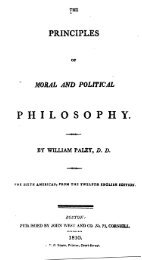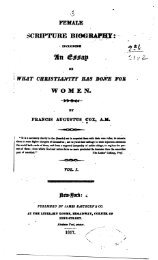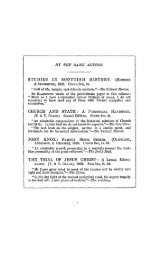BIBLE HISTORY - Classic Works of Apologetics
BIBLE HISTORY - Classic Works of Apologetics
BIBLE HISTORY - Classic Works of Apologetics
You also want an ePaper? Increase the reach of your titles
YUMPU automatically turns print PDFs into web optimized ePapers that Google loves.
174 SP/RITUAL ANALOGIES OF THE PLAGUES.<br />
plants <strong>of</strong> a red color," making the water red,<br />
is to miss the spiritual and perennial fact that,<br />
whether these accounts are valid or not, even<br />
the best idol- be it a constitution or a manwhen<br />
it has been made to represent crowned<br />
unrighteQusness, will inevitably be made a<br />
curse by the first appearance <strong>of</strong> uncrowned<br />
righteousness.<br />
As much may be said <strong>of</strong> the spiritual truths<br />
conveyed to any but the disobedient mind <strong>of</strong><br />
Egypt, in the other plagues visited upon the<br />
land and people <strong>of</strong> Pharaoh. The frog had a<br />
high place in the animalistic worship <strong>of</strong> the<br />
realm. Probably the mud consequent on the<br />
annual inundation <strong>of</strong> the Nile had produced<br />
vast multitudes <strong>of</strong> these. Magicians could<br />
imitate Moses to a slight extent. But only<br />
Moses - only the supremacy <strong>of</strong> righteousness<br />
-'-can ever make the life <strong>of</strong> man worth living<br />
and the air he breathes pure. Again, God was<br />
Jehovah.<br />
Sir Samuel Baker informs us that, after the<br />
rice harvest, it <strong>of</strong>ten seems that" the very dust<br />
is turned into lice." But, in remembering the<br />
plague <strong>of</strong> lice which followed the plague <strong>of</strong><br />
frogs in Egypt, he must not forget the fact that<br />
Aaron's rod had touched the dusty earth.<br />
"Beware," says Emerson, "when God lets<br />
loose a thinker on the planet: then all things<br />
are at a risk." Aaron's rod was full <strong>of</strong> the<br />
divine vitality <strong>of</strong> truth, even to the point <strong>of</strong><br />
budding. One living idea, touching a world <strong>of</strong><br />
things out <strong>of</strong> harmony with its command,<br />
turns them all into curses. The very dust becomes<br />
lice. No magician can imitate this miracle,<br />
as those <strong>of</strong> Egypt could not. It is <strong>of</strong><br />
God's true magic; only the genius <strong>of</strong> progressive<br />
righteousness may perform it; and it is<br />
performed all the while, whenever an unobeyed<br />
truth comes into contact with recalcitrant untruth.<br />
Oid saws <strong>of</strong> obsolescent wisdom roused<br />
into a kind <strong>of</strong> life by a fresh, inherently supreme<br />
purpose in history, are 'the lice whose<br />
presence "hardens Pharaoh's heart." Even<br />
the magicians <strong>of</strong> the dull-eyed time sometimes<br />
say, as did those <strong>of</strong> Pharaoh's court, "It is the<br />
finger <strong>of</strong> Elolzim." This is only part <strong>of</strong> the<br />
truth. It is more sympathetic with the whole<br />
truth to say, "It is the finger <strong>of</strong> Jehovah."<br />
But Pharaoh had not been led far enough to<br />
utter the new and memorial name: "Jehovah."<br />
The very name involved a statesmanship<br />
which meant ruin to his empire.<br />
Another utterance <strong>of</strong> God - and other small,<br />
pestiferous, winged creatures swarmed in the<br />
air. This was a heavy stroke against the popular<br />
worship. This plague infests the land to<br />
this day; but it can never have such significance.<br />
These insects were the nation's very<br />
symbols <strong>of</strong> "the creative principle, its emblems<br />
<strong>of</strong> the sun." The pr<strong>of</strong>anity was that<br />
they had become noxious vermin. Every reformer,<br />
perforce, by his iutroducing contrasting<br />
justice into unjust life or society, is a Moses<br />
whose power no Pharaoh suspects. Still the<br />
tyrant cries, "It is Elohim." " Yea," Moses.<br />
... "ould have added, "andJelzovalz!" "Let the·<br />
Hebrews go," said Pharaoh, at last; but on the<br />
cessation <strong>of</strong> the plague, he "hardened his:<br />
heart" I again.<br />
Following upon these, was the murrain, with.<br />
its extensive desolation <strong>of</strong> death amongst the<br />
cattle. This stroke against the religiousness:<br />
<strong>of</strong> Pharaoh's nation was severe. The cow and<br />
ox in Egypt were sacred; and, therefore, Isis<br />
and Osiris were <strong>of</strong>fended gods. By this immense<br />
event, Apis and Mnevis had been insulted<br />
and pr<strong>of</strong>aned. Deities <strong>of</strong> evil are always<br />
dethroned by goodness; and the iconoclast<br />
is thought a nuisance, insolent and rebellious.<br />
And now man is touched. First, the tlzi1lgs he<br />
worships, or prizes, are smitten by any progressive<br />
truth to which man is disobedient - first,.<br />
his pr<strong>of</strong>its, or his ancient and outworn institutions;<br />
then the man himself is stricken. It is<br />
the method <strong>of</strong> progress. Even the magicians<br />
yielded before the nlcers and tumors <strong>of</strong> the<br />
people. Political and ecclesiastical magic goes<br />
down before realities. Liberty and truth cannot<br />
hide unpleasant facts. 'When Moses and<br />
Aaron threw into the air the ashes from the<br />
huge furnaces, which were the emblems <strong>of</strong><br />
their slavery, the spirit <strong>of</strong> freedom used the<br />
magic <strong>of</strong> their visible chains, as later, in writing<br />
"Uncle Tom's Cabin," that spirit was able<br />
to bring a nation to its better ideal. Still Jelzovah<br />
was unacknowledged by the throne <strong>of</strong><br />
Egypt. Any victory without that acknowledgment,<br />
Moses knew, was a spiritual defeat.<br />
All real progress is by the ad vance <strong>of</strong> ideas.<br />
The harvest.growing fields <strong>of</strong> Egypt were<br />
swept with storm.<br />
" For what avails the plough or sail,<br />
Or land, or life, if freedom fail? "<br />
Man is not made for grain - grain exists for<br />
man; and at such crises, man untrue to his<br />
destiny is worthless. Let the grain fail! "I<br />
am Jehovah." 2<br />
Again the humbled Pharaoh listened awhile<br />
to the warning voices. Moses was instant upon<br />
the essential thing: "Ye will not yet fear<br />
Jehovah-Elohim." 3 It is significant that the<br />
reformer tries to help Pharaoh from one step to<br />
the next, using what he has acknowledged in<br />
connection with what he ought to acknowledge<br />
-"Jehovah-Elohim," he says. It was more<br />
evident than ever that Moses could not afford,.<br />
and was not seeking, a personal triumph. God<br />
had said to Pharaoh through him: "How long<br />
wilt thou refuse to humble thyself before<br />
I Exodus \·iii, 2S-32. 2 Exodus vi, 2. :3 Exodus ix, 30..





